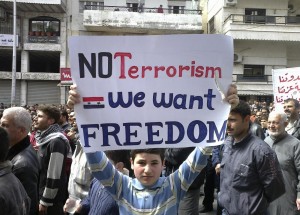Maybe you have not noticed, but in recent months have shown us the news almost daily images of demonstrations, riots and popular uprisings in the Mediterranean, never introduce a leader of the revolt. The only leader who was mentioned was to be killed: Ben Ali, Mubarak, Gaddafi, Bashar al-Asad, and so on.
We have seen pictures of the state television (few) images filmed by independent reporters (a little 'more), images taken directly from some protesters with an amateur camera phone or even with (many). We have seen a veritable revolution in Tunisia, Egypt, Libya and now in Syria. Yet no commentator has bothered to tell who is who, in those countries, was put in charge of the opposition to the regime, who has driven or simply inspired men and women take to the streets to ask, rather: pretending , freedom and democracy.
What's his name? How old is he? What do you do in life? Where did you study? It is high or low? Nobody knows, nobody wanted to tell. Why not have gone to interview him? The journalists have taken the leave all at the same time? Were attacked by a sudden attack of laziness? It is perhaps of some epidemic illness as the infamous chronic fatigue syndrome? No, do not worry: it is not a health issue.
It is just that these revolutions, do not have a leader right had, and still do not have it. The movements, claims, protests and riots: they are born from below, coordinated through the mouth and the Internet. It consists of microgroups activists connect to each other through various levels "network", who around a blog, some on skype, twitter or facebook.
Cyber-activists, as he wrote in Corriere Viviana Mazza, there are also the organizers, "but they help the committees to share information and spend their days" to confirm the data on arrests, deaths, protests, "going around (and by teaching others to work around) the complaint. As I said, this is the only leaderhip to be killed.
More than leadership is, literally, leadershit. That should not be replaced with another leadership, but simply removed, because the new players do not seem to feel the need and seem perfectly able to move and organize in an autonomous and participative. Depend on some peculiarities of the new generation player in the Arab World, Middle Eastern or North African? Or are we facing a large-scale historical change, whose effects become more evident and significant in all economic, social and political world? Corrado Guzzanti would say, "the second you said." And in the next post I will try to tell why. 


We have seen pictures of the state television (few) images filmed by independent reporters (a little 'more), images taken directly from some protesters with an amateur camera phone or even with (many). We have seen a veritable revolution in Tunisia, Egypt, Libya and now in Syria. Yet no commentator has bothered to tell who is who, in those countries, was put in charge of the opposition to the regime, who has driven or simply inspired men and women take to the streets to ask, rather: pretending , freedom and democracy.
What's his name? How old is he? What do you do in life? Where did you study? It is high or low? Nobody knows, nobody wanted to tell. Why not have gone to interview him? The journalists have taken the leave all at the same time? Were attacked by a sudden attack of laziness? It is perhaps of some epidemic illness as the infamous chronic fatigue syndrome? No, do not worry: it is not a health issue.
It is just that these revolutions, do not have a leader right had, and still do not have it. The movements, claims, protests and riots: they are born from below, coordinated through the mouth and the Internet. It consists of microgroups activists connect to each other through various levels "network", who around a blog, some on skype, twitter or facebook.
Cyber-activists, as he wrote in Corriere Viviana Mazza, there are also the organizers, "but they help the committees to share information and spend their days" to confirm the data on arrests, deaths, protests, "going around (and by teaching others to work around) the complaint. As I said, this is the only leaderhip to be killed.
More than leadership is, literally, leadershit. That should not be replaced with another leadership, but simply removed, because the new players do not seem to feel the need and seem perfectly able to move and organize in an autonomous and participative. Depend on some peculiarities of the new generation player in the Arab World, Middle Eastern or North African? Or are we facing a large-scale historical change, whose effects become more evident and significant in all economic, social and political world? Corrado Guzzanti would say, "the second you said." And in the next post I will try to tell why.



- Hayden Panettiere showed off her misspelled tat (26/04/2011)
- Hayden Panettiere Talks about Her Unfortunately-Misspelt Tattoo (26/04/2011)
- Japan : This is not the end of world N.23 (16/03/2011)
- Raffles > Home > Science Park II > Home. (25/04/2011)
- Come parlare con sé stessi da veri PRO (#Scemenziario by @MatteoBianx) (25/04/2011)
No comments:
Post a Comment